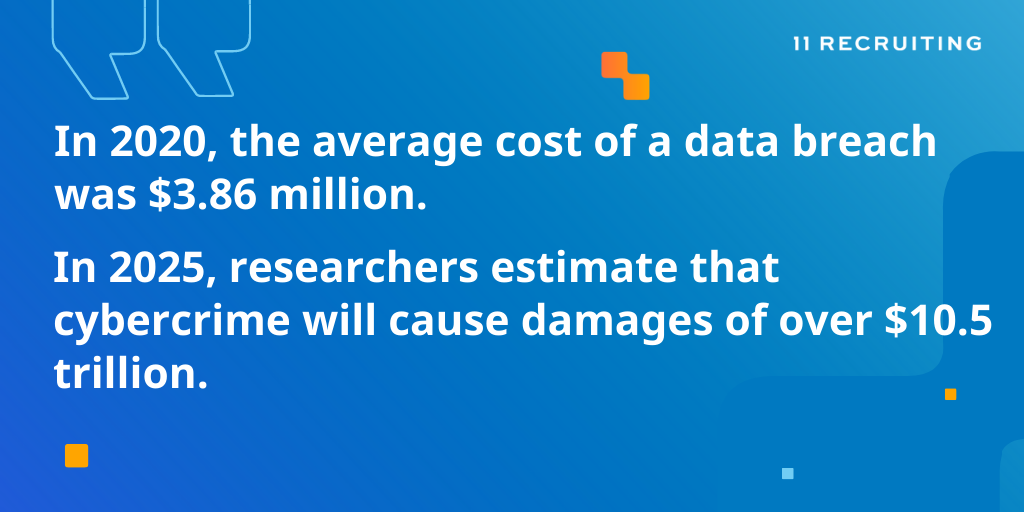
Whether it’s a ransomware virus taking down hospitals worldwide or your local high school’s network being hacked to change grades, cyber security threats are everywhere.
These threats are bad news for companies, but they present incredible opportunities if you’re looking to start a career in the field. Cyber Security is a booming industry, and now is the best time to start a career in this space.
In this article, we’ll look into the importance of cyber security in companies. We’ll also go into the future of these jobs, salaries you can expect, and skills needed to land an offer.
Importance of Cyber Security In a Company
How many times have we heard this story: some savvy hacker got access to a site’s database – swiped all the credit cards, and went on a shopping spree?
Scary, huh? The above example might get you to empathize and understand the importance of cyber security in companies.
Here are some other reasons why cybersecurity is important:
It saves money for companies

In 2020, the average cost of a data breach was $3.86 million. In 2025, researchers estimate that cybercrime will cause damages of over $10.5 trillion.
These breaches cause massive financial damage to companies, making them want to hire cyber security experts and pay top dollar for the right candidate.
The hackers are becoming smarter
These days, hackers are becoming sophisticated – they’ve even managed to hack a large company like Facebook (they got hold of phone numbers and personal data of over 533 million users). It goes to show how necessary cybersecurity is even for big companies.
Protects the reputation of a company
People trust companies to keep their data private and safe. So a breach can seriously damage their confidence in a company. These people may then decide to switch to a competitor who they feel is more trustworthy and secure. It’s easy to see why cyber security is vital to maintain a company’s reputation.
There’s danger in the cloud
Between Jan and Apr 2020, cloud-based cyber-attacks increased by a factor of 630%. These attacks pose a challenge for cybersecurity in a business that hosts sensitive data in the cloud.
Future of Cyber Security Jobs
Clearly, the above examples show the importance of cyber security. And with cybercrimes increasing, companies are heavily investing in building tech security teams.
According to a study, there’s a cyber-security skill-shortage of 3.1 million professionals. Additionally, the Bureau of Labor Statistics mentions that security will grow at a rate of 37% from 2012 through 2022, which is considerably faster than other professions.
As you can see, the cyber security train is not about to stop soon, so if you want to get a piece of the cybersecurity pie, now is an excellent time to enter the job market.
Skills Needed For a Cyber Security Job
Here’s some good news – most entry-level cyber security jobs don’t require a bachelor’s degree in cyber security or any related field. For example, penetration tester’s don’t need formal qualifications.
Advanced jobs, however, require a bachelor’s degree or a master’s. Additionally, to get to a mid-level position, you’d need 7-13 years of experience.
Another excellent way to jump-start your career in the field is to take up a bootcamp or do courses/certifications.
Below are some of the technical skills companies look for:
- Risk assessment – Cyber security risk assessments are at the core of any successful cyber security plan. So specialists must be able to assess, manage, and mitigate cybersecurity risks in businesses.
- Understanding of the Linux operating system – The Linux OS is a cyber security specialist’s most important operating system. The OS is used on most network devices and security appliances, including virtual private network concentrators, intrusion detection systems, routers, firewalls, and more. So a solid understanding of Linux is a must.
- Understanding information systems – Large corporations use information systems to manage data. It is then critical for these companies to have an expert check for system vulnerabilities and weaknesses. Hence knowledge in information systems is mandatory.
- Coding Languages – Skill in coding languages makes cyber security specialists better at their job. Good programming capability helps experts detect malicious coding, find vulnerabilities, and execute various tasks.
And here are some soft skills required.
- Attention to Detail – With cyber security, the ‘devil’s in the details’. Cyber attacks can be difficult to detect, so attention to detail and the ability to notice minor changes is critical.
- Creative Problem Solving – Hacker’s can be innovative. They can infiltrate your system in new, never before seen ways. So it is important to be able to come up with new solutions when faced with new threats.
- Clear communication – Cyber security specialists work with various teams in different departments of a company. It is then important for these individuals to communicate policies and technical information in an easy to understand manner.
- A desire to learn – The field of cyber security is a fast changing one. Those who work in the field need to keep abreast of the latest industry trends, so a desire to constantly learn and evolve is a must.
Top 5 Cyber Security Roles
- Chief Information Security Officer (CISO) – CISO’s develop and maintain information security and risk management programs. They also interact with stakeholders and brief them about security concerns. Average annual salary is $160,000.
- Security Architect – These guys design security measures to prevent malware attacks as well as perform vulnerability tests. Average annual salary is $123,000.
- Cyber Security Engineer – They plan security measures to prevent companies from coming under cyber attacks. Average annual salary is $96,220.
- Malware Analysts – Have you come across malware prevention softwares on your phones and computers? Well, malware analysts are responsible for creating these. They also identify viruses, bots, and worms and document methods to avoid threats from them. Average annual salary is $92,000.
- Computer Forensic Analyst – Computer forensic analysts gather digital evidence and retrieve data in case of a cybercrime. Average annual salary is $73,000.
A Day in the Life of a Cyber Security Specialist
Cyber security jobs aren’t typical 9 to 5 jobs. Everyday is a new day, with new things to learn and new threats to combat. Sometimes cyber security specialists will have to work overtime to fix system vulnerabilities, remove a network’s weak spots, and liaison with affected customers and stakeholders. Let’s take a further peek into the typical roles and responsibilities of a specialist.
- Cyber security specialists run weekly scans and report on the system’s security health and status.
- They research threats and search for vulnerabilities. If they find any vulnerabilities, they patch things up.
- Experts also develop risk mitigation strategies for operating systems and networks.
- They are responsible for creating policies and procedures for vulnerability management.
- They install required security software and maintain them.
The average cyber security salary is $115,796/year. Entry-level positions start at $87,500 and higher-level positions offer up to $160,000.
Frequently Asked Questions
Is Coding Required for Cyber Security?
Entry-level cyber security positions don’t require a lot of coding skills, however, for mid-level positions and higher, it’s important to know them. If you want to progress your career in this field and get a strong grasp of information security, then not learning coding isn’t an option.
Is Cyber Security a Stressful Job?
Cyber security is a stressful job. Some reasons for this include people feeling overworked due to staff shortages in companies, overwhelming workloads, and skill shortages. Additionally, due to the nature of the job, Specialists have long working hours and can be asked to work during non-working hours to resolve sudden issues.
Is Cyber Security Hard To Learn?
It can be difficult to learn if you want to become an expert in the field. You’ll have to keep up to date with the latest trends and technologies in the market and be good at coding. You’ll also have to put in time and effort if you want high-paying jobs. But for an entry-level job, you can learn cyber security basics fairly easily.

